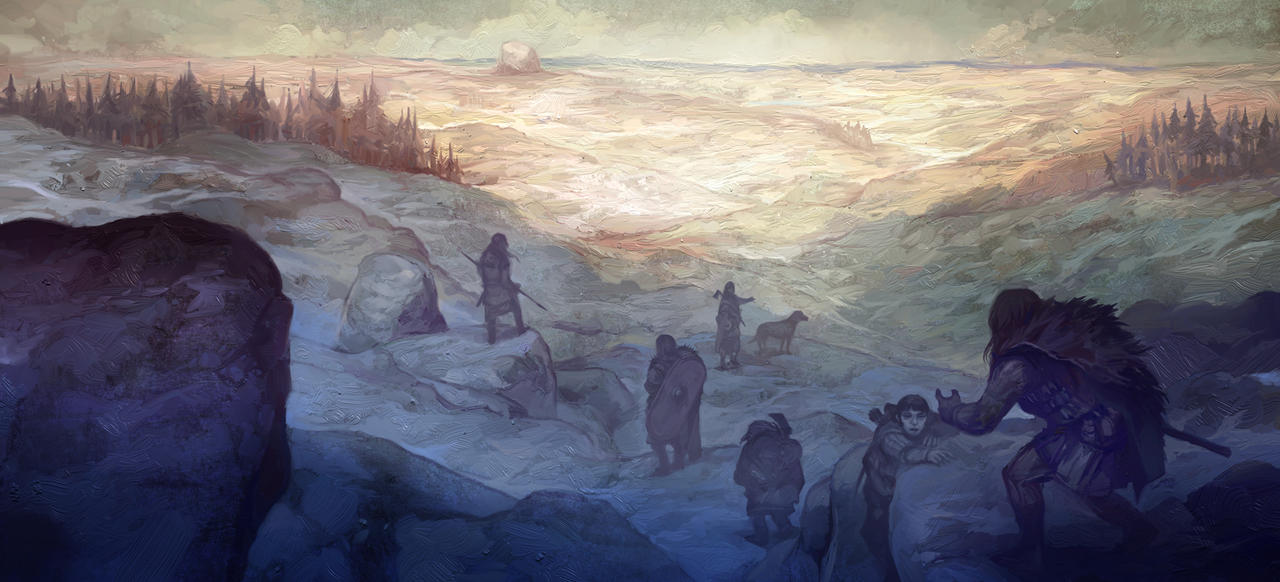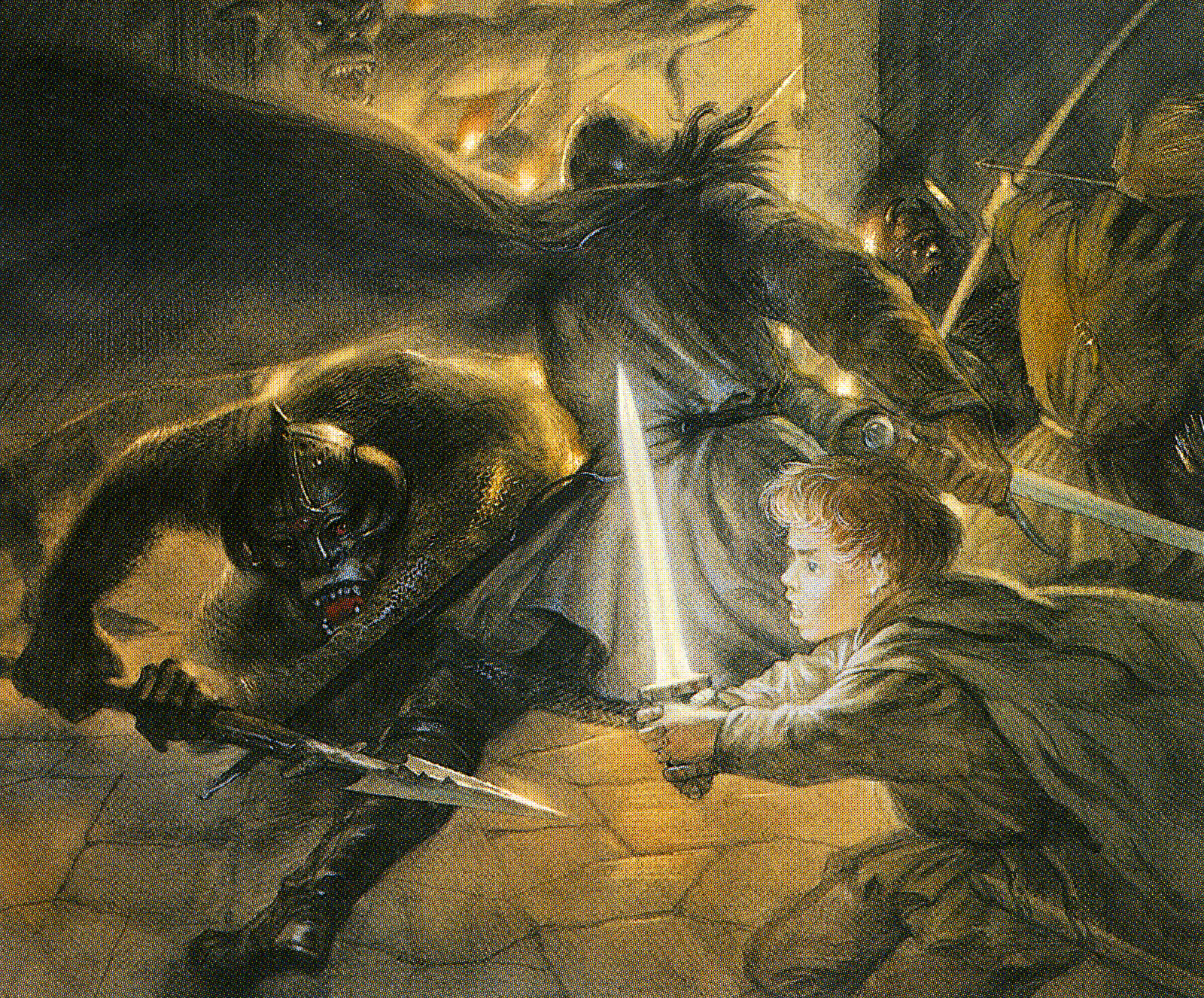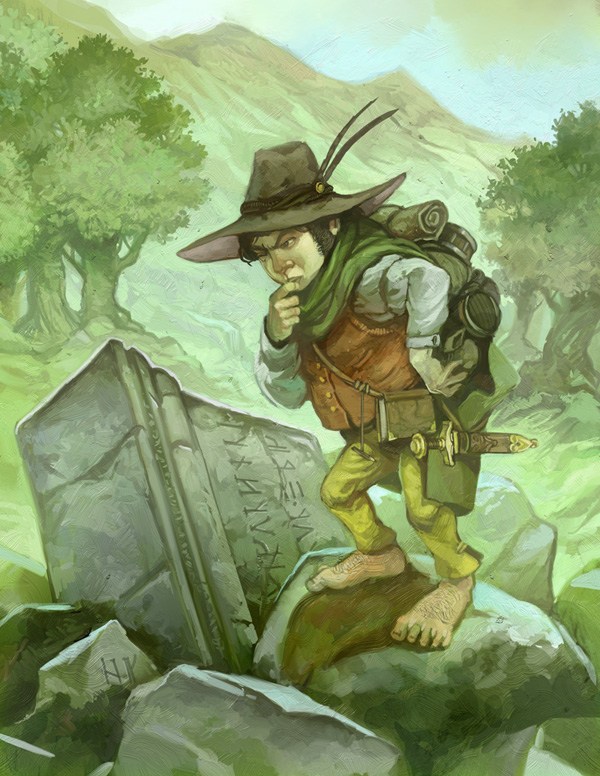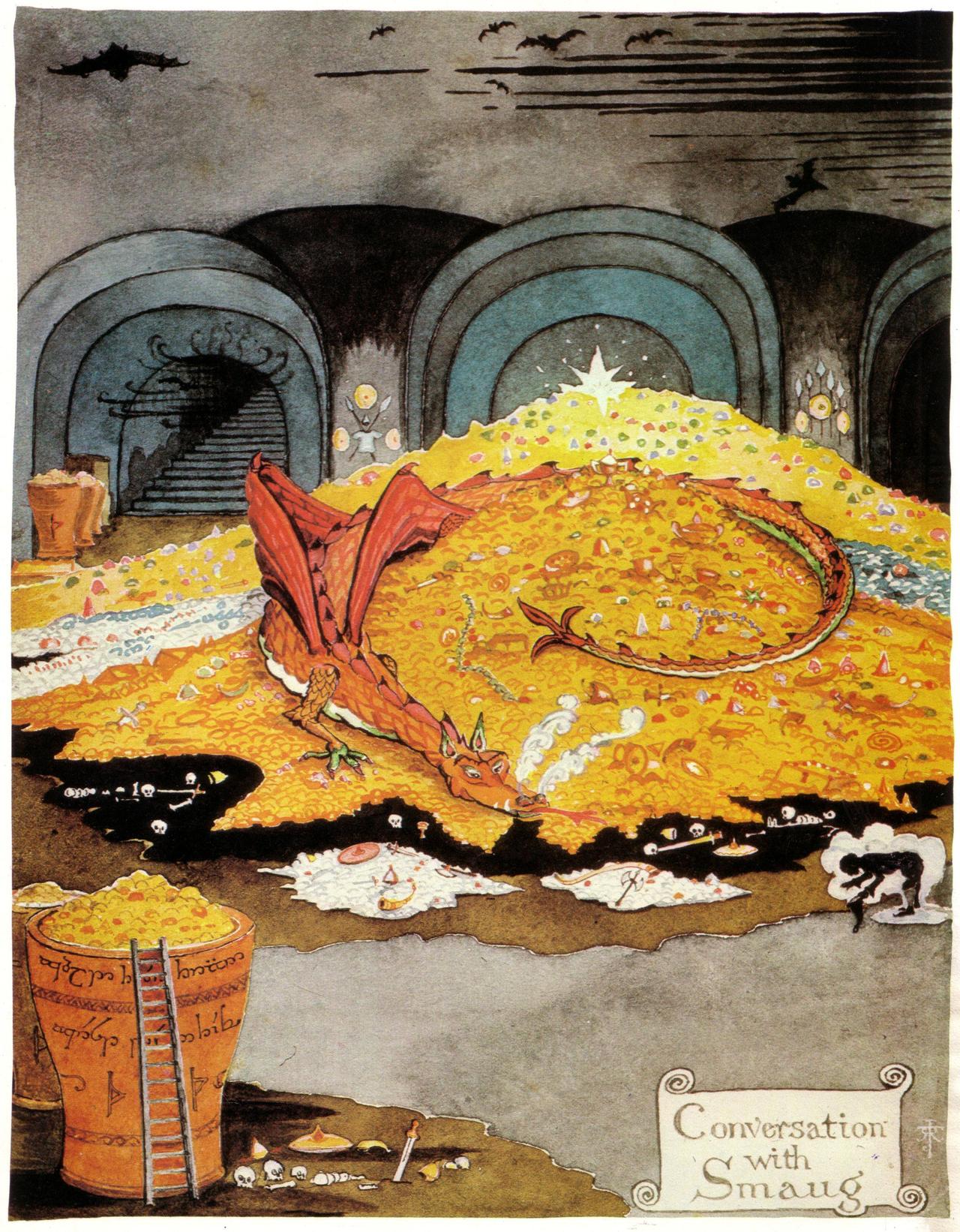 |
| Jon Hodgson |
So last time, we looked at how to use the existing tools in Whitehack to attempt an 'authentic' themed Middle-earth game. We covered changed stats, new classes, and how to reward quests that take companies far abroad. We'll continue our Whitehack adaptation of The One Ring and this time around we'll tackle the Shadow.
The Shadow
Whitehack already has some nifty rules for handling corruption. It basically involves a scale from 1-10 and above. There's an ever-increasing gamble with effects lasting longer and effects building based on when you choose to save. Wait too long to make your saving throw and your corruption might get too high to avoid permanent effects. We can use this nicely, we'll just have to look at how to systematize ways that a character in Middle-earth might be affected (this isn't chaos wizards turning into slime mutants after all).(A little bit of commentary: you'll notice that compared to a "traditional" fantasy adventure game which sees the characters throwing themselves into any hellhole or haunted crypt they can find, the below rules will seem relatively harsh. The penalties of the Shadow can be long-lasting or even permanent. Dealing with a haunted crypt could be a harrowing experience. Finding an orc camp could change someone for life. This is intentional. Journeys are no small feat and any encounters during will be quite impactful. You'll probably have one or two a year and the experience will change you. These are dark times after all!).
So what is the Shadow? It's the weight of the presence of the forces of darkness in Middle-earth. It's the dread that weighs heavy on the hearts of most of the peoples of Middle-earth. Peoples to the South and East have fallen to it in multitudes. Sauron might be closer to victory than any dare dread!
But there is always hope and our intrepid need to be steadfast against this dread. So here are the triggers that can cause a character to gain Shadow Levels (SL):
- Anguish - Experiencing distressing events.
- Blighted Places - Going through or being in an area tainted by the Shadow.
- Misdeeds - Committing despicable and dishonorable deeds.
- Tainted Treasures - Some items and treasure might be tainted or cursed.
 |
| Khamul by John Howe |
Then suddenly he knew that he was imprisoned, caught hopelessly; he was in a barrow. A Barrow-wight had taken him, and he was probably already under the dreadful spells of the Barrow-wights about which whispered tales spoke.
- J.R.R. Tolkien, The Fellowship of the Ring
Anguish
The light is fading and characters will quickly realize just how fragile they and the world they know really are. Witnessing or directly experiencing a disturbing or distressing event causes a character to gain Shadow Levels. The table to should work together to determine how severe an event is using the following guidelines:
- A natural but unexpected tragedy or grievous occurrence (serious or deadly accident, death in the family, natural disaster). Make a save vs Shadow or gain 1 SL.
- A gruesome killing, dreadful experience, Orc-work, display of the power of the Enemy (a friend turned traitor, finding mutilated corpses, seeing an army of the Enemy mustering). Automatically gain 1 SL.
- A harrowing experience, physical or spiritual torment, the sorcery of the enemy (slavery, torture, the Black Breath, seeing the Eye). Gain 2 SL.
- A direct experience with the power of the enemy (Being interrogated by the Eye, captured by the Nazgûl). Gain 3 SL.
 |
| Jon Hodgson |
As their eyes became used to the dimness they could see a little way to either side in a sort of darkened green glimmer. Occasionally a slender beam of sun that had the luck to slip in through some opening in the leaves far above, and still more luck in not being caught in the tangled boughs and matted twigs beneath, stabbed down thin and bright before them. But this was seldom, and it soon ceased altogether. There was no movement of air down under the forest-roof, and it was everlastingly still and dark and stuffy and our heroes felt that they were being slowly suffocated.
- J.R.R. Tolkien, The Hobbit
Blighted Places
The dark seems thicker in the lair of a foul creature and the gloom hands around sites of black treachery. Grief, pain, and suffering never leave the black pits inhabited by the servants of the Dark Lord or the plains where bloody battles were once fought. When characters enter or linger an area that has become blighted by darkness, they must make a save vs Shadow. If they fail they gain 1 SL. The Referee has the final say on whether a place is blighted or not and how frequent saves should be made while in said areas.
- Free Lands, Border Lands - Frequency: save only during special circumstances.
- Wild Lands - Frequency: save once every week.
- Shadow Lands - Frequency: save once daily.
- Dark Lands - Frequency: save twice a day.
If you want to randomly determine if an area is blighted, roll for it. Roll 1d6 for Free/Borderlands, 2d6 for Wild Lands, and so on. If any die rolls a six, the area is blighted and requires saves as listed above. Areas that have long been home to minions of the Dark Lord or are currently infested by them, villages that have had a horrible murder or act of treachery, or places that are having their spirit poisoned by dark sorcery are great examples of Blighted Places.
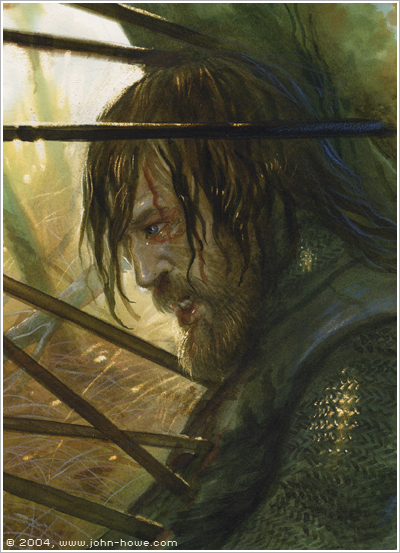 |
| Boromir by John Howe |
'Why not get rid of it? Why not be free of your doubt and fear? You can lay the blame on me, if you will. You can say that I was too strong and took it by force. For I am too strong for you, halfling,' he cried; and suddenly he sprang over the stone and leaped at Frodo.
- J.R.R. Tolkien, The Fellowship of the Ring
Misdeeds
Even the greatest and most virtuous of heroes can be tempted into dark actions. Misdeeds that would call their character into question. This can be the result of accident or misunderstanding, but also the temptation to do noble goals by dark means. Characters must stand fast against the dark impulses within.
There are no saves vs Shadow when it comes to Misdeeds. When you knowingly embrace the Shadow, there is no temptation to resist. Even attempting something despicable is a misdeed, regardless of its success.
If a player is unaware of a Misdeed (ex. ambush and kill someone they believed to be guilty of a brutal murder, only for them to innocent), they should not immediately gain SL. Their behavior when the mistake comes to light should be used to determine whether they should gain the SL or not.
The Referee should warn a player if they are about to carry out a misdeed. Use the following guidelines to determine severity:
- Accidental misdeed. See above.
- Violent threats. Gain 1 SL.
- Lying purposefully, subtly manipulating the will of others. Gain 2 SL.
- Cowardice, theft and plunder. Gain 3 SL.
- Unprovoked aggression, abusing own authority to influence or dominate. Gain 4 SL.
- Torment and torture, murder. Gain 5 SL.
| The One Ring by John Howe |
There for ages his huge bones could be seen in calm weather amid the ruined piles of the old town. But few dared to cross the cursed spot, and none dared to dive into the shivering water or recover the precious stones that fell from his rotting carcass.
- J.R.R. Tolkien, The Hobbit
Tainted Treasures
While gold can't tarnish like silver or rust like iron, it can corrupt faster than both. The treasure found in the lair of some dead monster or buried in a tomb long-sealed may be tainted. Such treasures can drive men to distraction and fill hearts with greed.
When such treasure is found, characters must make a save vs Shadow or gain SL.
When such treasure is found, characters must make a save vs Shadow or gain SL.
- From a Troll hoard - 1 SL
- From a Dragon hoard - 1 SL
- From an ancient barrow - 2 SL
- From a stronghold of the Enemy - 1 SL before save, 3 more SL if save fails
Effects of the Shadow
The traits from this type of corruption aren't your typical chaos mutations or anything. These are character flaws and traits. Inner faults that the Shadow exploits and twists to the surface. Use list below for inspiration.
These traits go from minor and fleeting to more troublesome and major. A character should stick to one or two of this listings and progress along them as they (hopefully) deal with their corruption.
- Spiteful, Brutal, Cruel, Murderous
- Grasping, Mistrustful, Deceitful, Thieving
- Resentful, Arrogant, Overonfident, Tyrannical
- Haughty, Scornful, Scheming, Treacherous
- Idle, Forgetful, Uncaring, Cowardly
As you can see, a corrupted PC is no mutant or direct evil. Think of a PC being in a fey mood for a day or two. Perhaps during the least few weeks of a journey, a PC is disastrously overconfident. Maybe there is even an ultimate act of betrayal or treachery from someone as their Shadow overtakes them.
Well, this was a little longer than expected. This should cover handling the Shadow from the One Ring in Whitehack. We'll have to do a third post covering journeys (and maybe an extra one on enemies and evil play).
